-
 Art of Wellness Acupuncture & Traditional Chinese Medicine (TCM)11704 Wilshire Blvd, Suite 295, Los Angeles, CA, 90025
Art of Wellness Acupuncture & Traditional Chinese Medicine (TCM)11704 Wilshire Blvd, Suite 295, Los Angeles, CA, 90025
myartofwellness@gmail.com310-451-5522 Office Hours
MonClosedTue7:30 am --4 pmWed7:30 am --4 pmThu7:30 am -- 4 pmFri7:30 am -- 4 pmSat7:30 am -- 4 pmSunClosedOur office opens from Tuesdays to Saturdays 7:30 am to 4 pm, will be closed on Memorial day, Independent day, Labor day, Thanksgiving day, Christmas and New year.
-
Recent Posts
- How to Treat Chronic Kidney Disease (CKD) With Acupuncture and TCM
- How to Treat Edema With Acupuncture and TCM
- How to Treat Cirrhosis With Acupuncture and TCM
- How to Treat SIBO With Acupuncture and TCM
- How to Treat Pruritus With Acupuncture and TCM
- How to Treat MCAS With Acupuncture and TCM
- How to Treat Shin Splints With Acupuncture and TCM
- How to Treat Dysautonomia With Acupuncture and TCM
- How to Treat Myofascial Pain Syndrome With Acupuncture and TCM
- How to Treat Costochondritis With Acupuncture and TCM
- How to Treat Ankylosing Spondylitis With Acupuncture and TCM
- How to Treat Gastroparesis With Acupuncture and TCM
- Sign up to receive news and updates and get my free report:“The Top 10 Reasons to Try Acupuncture”

Migraines & Headaches
How to Treat MCAS With Acupuncture and TCM
By Xiaomei Cai, L.Ac., Ph.D. and Qineng Tan, L.Ac., Ph.D.
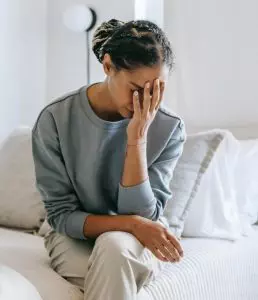
Shortness of breath, dyspnea? SIBO or fungal infections? Sensitive to smells? Signs of orthostatic low blood pressure? Itchy skin rash or hives? Musculoskeletal pain, joint pain? These can be some of the many different MCAS symptoms. Acupuncture and TCM can offer alternative treatment for MCAS, or mast cell activation disorders.
Mast Cell Activation Syndrome (MCAS) is a complex and often underdiagnosed condition characterized by the inappropriate activation of mast cells, which are immune cells involved in allergic and inflammatory responses throughout the body.
In short, mast cells are what cause people to have an allergic reaction to something. When mast cells encounter an allergen (or sometimes a medication, infection, or insect venom), antibodies inside them surface and send out “mediators.” Mast cells can produce hundreds of different types of mediators. These include histamine, leukotrienes and cytokines.
In MCAS, mast cells release excessive amounts of mediators, leading to a wide range of symptoms affecting various organ systems throughout the body. There are so many different mediators that science is not yet able to pinpoint which mediators may be causing which symptoms, in many cases.
This systemic activation of mast cells can occur spontaneously or in response to triggers such as stress, exercise, medications, infections, or environmental factors.
The symptoms of MCAS can vary widely among individuals and may mimic those of other conditions, making diagnosis challenging. There are five categories of MCAS symptom, affecting different parts or systems of the body:
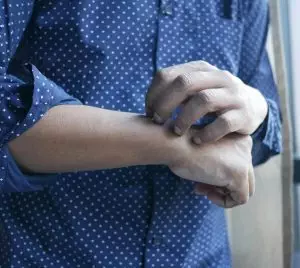
Skin-related MCAS Symptoms:
Itching (pruritus)
Hives (urticaria)
Flushing or redness of the skin
Rashes or eczema-like lesions
Swelling (angioedema), particularly of the face, lips, tongue, or throat
Gastrointestinal MCAS Symptoms:
Abdominal pain or cramping
Nausea and vomiting
Diarrhea or constipation
Acid reflux or heartburn
Bloating or abdominal distension
Respiratory MCAS Symptoms:
Wheezing or difficulty breathing (dyspnea)
Chest tightness or pain
Coughing or throat clearing
Nasal congestion or runny nose
Sneezing or postnasal drip
Cardiovascular MCAS symptoms:
Rapid or irregular heartbeat (palpitations)
Low blood pressure (hypotension)
Fainting or near-fainting episodes (syncope)
Fluctuations in blood pressure upon standing (orthostatic hypotension)
Raynaud’s phenomenon (abnormal blood vessel spasm in response to cold or stress)
Neurological MCAS symptoms:
Headaches or migraines
Dizziness or lightheadedness
Cognitive dysfunction or brain fog
Anxiety or panic attacks
Fatigue or malaise
These symptoms can vary in severity and may occur intermittently or chronically.
What Causes MCAS?
Medical science is unclear about the underlying cause of MCAS. Mastocytosis is a different mast cell disorder, in which people have an elevated number of mast cells. However, with MCAS, people have a normal number of mast cells; they just behave in an exaggerated manner when triggered.
MCAS is “primary” when there is a particular genetic mutation, which may happen due to mastocytosis or monoclonal mast cell activation syndrome (MMAS,) in which there is a clonal line of mast cells.
In some cases, when a person also has a diagnosed autoimmune disorder, allergy, or infection the MCAS is considered “secondary,” meaning that the overactive mast cell activity may be stemming from that other primary condition.
A diagnosis of “Idiopathic MCAS” indicates that neither of the above factors is present.
MCAS can begin at any point in a person’s life, including during childhood.
MCAS Treatment
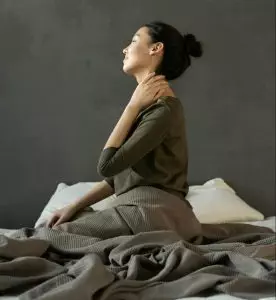
Treatment for Mast Cell Activation Syndrome (MCAS) in Western medicine typically involves a combination of medications and lifestyle modifications aimed at stabilizing mast cells and alleviating symptoms.
Antihistamines, such as H1 receptor blockers (e.g., loratadine, cetirizine) and H2 receptor blockers (e.g., famotidine, ranitidine), are commonly prescribed to reduce the effects of histamine released by mast cells.
Mast cell stabilizers, such as cromolyn sodium, can help prevent the release of inflammatory mediators from mast cells and may be used as preventive therapy. In cases of severe or refractory symptoms, corticosteroids or leukotriene inhibitors may be prescribed to suppress the immune response and reduce inflammation.
Medications to manage specific symptoms, such as gastrointestinal distress or cardiovascular symptoms, may be recommended.
Lifestyle modifications, such as avoiding known triggers, managing stress, and following a healthy diet, may also play a crucial role in managing MCAS symptoms.
It’s important for individuals with MCAS to work closely with their healthcare providers to develop a personalized treatment plan. Acupuncture and TCM can provide adjunct treatment for MCAS that address each patient’s unique symptoms and needs.
Can Acupuncture Help MCAS?
One of the central concepts of Traditional Chinese Medicine, which dates back many centuries, is that of the meridian system. The 12 meridians are channels of energy, or Qi, that flow throughout the body. Along the meridians are many acupoints: spots where Qi is activated when thin acupuncture needles or acupressure are applied to them.
But do the meridians exist as physical entities, or are they metaphorical?
Scientific research in the twentieth century sought to explain the various phenomena produced by the activation and manipulation of acupoints. It was found that both blood vessels and nerves are located near the acupoints in greater concentration than in other areas of the body. These studies suggested that acupuncture treatment functions through the vascular and nervous systems.
Later, further studies showed that acupuncture has effects on the production and releasing of hormones, such as endorphins, which has a analgesic effect of reducing pain.
The sensations that people feel as a result of acupuncture treatment cannot be fully explained by saying they are related to blood vessels, nerves, or hormones. Further questioning continued, asking if other cells or tissues could also be involved in how acupuncture works.
One female scientist, researcher, and professor in China, Jimei Song, hypothesized that activity around acupoints may be related to mast cell activation. This idea was Song’s Mast Cell Theory of Acupuncture (now called Song’s MC Theory for short, originally published in the Liaoning Journal of Traditional Chinese Medicine (TCM) in 1977.

Studies suggest that when an acupuncture needle penetrates the skin, mast cells are released, which then in turn, affect the blood vessels and nerves, leading to both sensations experienced by the patient in the moments, and systemic effects on the release of histamines, serotonin, and other chemicals than go on to create systemic effects. This is now considered a milestone in TCM research.
Acupuncture has been shown to have a positive effect on histamine response. Specific Chinese herbal formulas have also been shown to be effective in dampening mast cell activation. Compounds found in some herbs can help inhibit the production of cytokines.
An acupuncturist is able to address the problem both at its root, and help take care of the wide variety of symptoms a person may be experiencing. Acupuncture treatment can help relieve problems like itchy skin rash, sensitivities, orthostatic low blood pressure, and joint pain, all in one treatment session. A personalized herb formula can be prescribed to suit each individual patient.
Acupuncture Near Me for MCAS in Los Angeles
MCAS can mimic many other conditions and be difficult to diagnose and treat. This is what makes acupuncture, herbs, and moxibustion excellent modalities for helping to relieve MCAS symptoms such as: dizziness, headaches, musculoskeletal pain, insomnia, anxiety, hives, GERD, SIBO, IBS, interstitial cystitis bladder pressure, and more. Acupuncture and TCM can offer an adjunct or alternative treatment for MCAS symptoms.
*This article is for education from the perspective of Traditional Chinese Medicine only. The education provided by this article is not approved by FDA to diagnose, prevent, treat and cure human diseases. It should not stop you from consulting with your physician for your medical conditions. Traditional Chinese Medicine is based on Qi, which is an invisible force that usually cannot be observed by modern science. Because science focuses on testing ideas about the natural world with evidence obtained through observation, these aspects of acupuncture can’t be studied by science. Therefore acupuncture and Chinese herbs are often not supported by double-blind, randomized trials, and they are considered alternative medicine therapies in the United States.
How to Treat BPPV (Vertigo) With Acupuncture and TCM
By Qineng Tan, L.Ac., Ph.D. and Xiaomei Cai, L.Ac. Ph.D.

Dizzy when lying down? Waking up dizzy? Head spinning sensation when you move from one position to another? These could be BPPV symptoms. Benign Paroxysmal Positional Vertigo (BPPV) is a common vertigo cause. Acupuncture and TCM offer an alternative or adjunct BPPV treatment to help relieve positional dizziness.
Benign Paroxysmal Positional Vertigo (BPPV) is one of the most common causes of vertigo, a condition characterized by a feeling that the room is spinning.
BPPV is an inner ear disorder that affects the vestibular system, which controls your sense of balance. BPPV causes you to feel dizzy. The words “positional vertigo” in the name refer to the fact that the dizziness happens after you move your head, either by tilting or turning it, or you get dizzy when getting up from laying down.
Unlike some other forms of vertigo, BPPV is considered relatively harmless; hence the word “benign” in the name. However, its sudden and unpredictable nature can be very unsettling, and have a real impact on your daily life.
BPPV occurs when small calcium particles called otoconia, which are normally located in the inner ear, become dislodged and migrate into one of the ear’s semicircular canals. When these particles move with changes in head position, they can disrupt the normal flow of fluid in the canals, sending incorrect signals to the brain about the body’s position. This mismatch between visual and vestibular signals leads to the characteristic symptoms of BPPV.
What Causes BPPV?
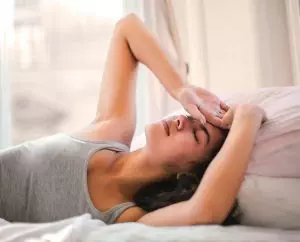
In most cases, doctors do not find a clear BPPV cause when patients see them about recurring dizziness. However, it is possible for certain conditions to possibly cause BPPV. These could include:
- Head injury, head trauma
- Migraine headaches, vestibular migraine
- Meniere’s disease
- Labyrinthitis
Migraine associated vertigo is common, and vice versa; people with BPPV are more likely to experience vestibular migraine, or a migraine headache due to problems with the inner ear. Patients who have BPPV treatment in the form of repositioning, as discussed below, may also be more likely to have migraines afterwards.
Top 10 BPPV Symptoms
That dizzy, spinning sensation is the primary, recognizable symptom of vertigo, but when a person has BPPV, there may be other signs, too. These are the most common symptoms of BPPV:
- Dizziness: Sudden and intense episodes of dizziness, often triggered by changes in head position, such as rolling over in bed or tilting your head back.
- Vertigo: A spinning or whirling sensation, as if the room is rotating around you. This sensation is usually brief but can be severe.
- Light-headed: feeling faint or dizzy.
- Nystagmus: Involuntary, rapid eye movements, typically triggered when changing head position. These eye movements are a hallmark of BPPV and can help doctors diagnose the condition. It may feel like you’re seeing wavy lines or objects around you “jumping” or moving.
- Blurred Vision: the inner ear is connected with the eye muscles, so this imbalance can affect vision, and even cause foggy vision, double vision, and/or sensitivity to light.
- Imbalance: Difficulty maintaining balance, especially when getting up from a lying or seated position. This can lead to unsteadiness and an increased risk of falling.
- Nausea: Some people with BPPV may experience nausea or vomiting, particularly during severe vertigo episodes.
- Fatigue: The unpredictability of BPPV attacks and the effort required to maintain balance during episodes can lead to feelings of exhaustion.
- Anxiety: BPPV can cause anxiety, as individuals may fear the sudden onset of vertigo and its potential impact on their daily activities.
- Tinnitus: Some individuals with BPPV may experience ringing in ear or buzzing in the affected ear, or even hearing loss.
BPPV Treatment and Diagnosis
There really are no lab tests that confirm a diagnosis of BPPV. A doctor will usually perform a test called the Dix-Hallpike maneuver, in which you are asked to turn your head and lie down, and then sit up again 20 to 30 seconds later. During this test, the physician will carefully observe for signs of nystagmus, the rapid eye movement that is one of the classic signs of BPPV.
A doctor may perform other tests like an MRI or CT scan to rule out other possible causes of vertigo.
Sometimes, doctors will recommend a wait and see approach, as many times, BPPV symptoms will resolve on their own in a matter of weeks or months.
Benign paroxysmal positional vertigo treatments can include vestibular suppressant medication. Medications for BPPV aim to provide vertigo treatment that reduces symptoms of dizziness and nausea.
Benzodiazepines, like Valium, may be prescribed because they can help reduce acute vertigo and the sensations of motion sickness. These medications can be habit-forming and have side effects. They also have to be reduced gradually, because of withdrawal symptoms.
Antihistamines, like Benadryl, may be recommended, as they can also reduce feelings of nausea.
Anticholinergics are vestibular suppressants that block receptors in the nervous system. They are used to treat many conditions that involve involuntary movement. However, they can cause a lot of side effects and worsen other conditions like prostate problems, irregular heartbeat or rapid heartbeat, glaucoma, dementia, and depression.
None of these medications address the root cause of dizziness.
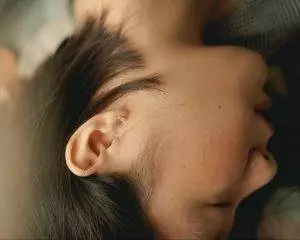
The preferred treatment for BPPV is usually a canalith repositioning procedure (CRP) can be done with one of a few different maneuvers that doctors can perform to try to move the particles in the inner ear that are causing BPPV. These are often helpful in the short term to relieve vertigo, but often patients do have a recurrence of BPPV symptoms again.
For some people, repositioning is not a good option—if you have problems with your cervical spine, or serious cardiovascular problems, for example.
Acupuncture and TCM offer an alternative treatment for BPPV that can relieve dizziness and other vertigo symptoms without any unwanted side effects.
Can Acupuncture Help BPPV?
According to TCM theory, phlegm is one of the pathogenic forces that can take hold in the body, along with things like dampness, dryness, etc. Phlegm builds up when fluids in the body are not being transported and moving the way they should; they get caught in an area and become condensed and thick, causing blockages of energy and movement.
The San Jiao, or “triple burner,” is an important concept used in TCM theory; the San Jiao controls the movement of fluids in the body. In cases of vertigo, phlegm and heat become stagnant due to the malfunctioning of the Jiao. This causes phlegm to be pushed upwards in the body.
In TCM, we may diagnose BPPV and other vestibular problems as having their root cause in a buildup of phlegm in the head that is causing a blockage in the inner ear.
Wind is another pathogenic force that can get into the body and cause problems that seem to come and go. Some cases of dizziness may be due to wind in the head.
Thus, the TCM protocols for BPPV treatment will aim to clear dampness, phlegm, and wind, and get fluids and Qi energy moving again.
Herbs can play an important role in treating vertigo. Chinese herb formulas that warm Yang energy and strengthen the kidneys and spleen can help to clear phlegm.
Use of specific acupoints with acupuncture treatment can help relieve vertigo—sometimes patients feel much less dizziness, even after one treatment. Not only can TCM treatment for BPPV help improve vertigo right away, but regular acupuncture session can help prevent bouts of dizziness from happening.
Acupuncture Near Me for BPPV in Los Angeles, Santa Monica
TCM is a great modality for helping to relieve dizziness due to all types of health conditions, including migraines, POTS, Ehlers-Danlos Syndrome, Meniere’s disease, multiple sclerosis (MS), diabetes, sinus issues, ear infections, and the side effects of medications. Acupuncture can be an excellent alternative for vertigo if other treatments have not helped. Dr. Tan and Dr. Cai at Art of Wellness in West L.A. can help get to the bottom of recurring dizziness, so you can feel steady again.
*This article is for education from the perspective of Traditional Chinese Medicine only. The education provided by this article is not approved by FDA to diagnose, prevent, treat and cure human diseases. It should not stop you from consulting with your physician for your medical conditions. Traditional Chinese Medicine is based on Qi, which is an invisible force that usually cannot be observed by modern science. Because science focuses on testing ideas about the natural world with evidence obtained through observation, these aspects of acupuncture can’t be studied by science. Therefore acupuncture and Chinese herbs are often not supported by double-blind, randomized trials, and they are considered alternative medicine therapies in the United States.
How To Help Dependence on Hydrocodone and Other Opioid Pain Medication With Acupuncture and TCM
By Qineng Tan, L.Ac., Ph.D. & Xiaomei Cai, L.Ac., Ph.D.
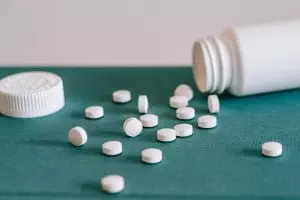
Many people are prescribed strong pain medication when they are in need of pain relief. Opioid drugs may help relieve pain, but they can also create a physical dependence as a person develops a tolerance for the painkillers. Acupuncture and TCM offer an alternative to opiate drugs and opioids like Codeine and Vicodin for treating pain, and a way to help treat both opioid dependence and addiction.
We often hear in the news that the U.S. is facing an “opioid epidemic.” Recent statistics suggest that over ten million Americans may have an opioid use disorder. CDC data showed that over 75,000 people died from opioid overdoses in 2021.
Some of the most commonly used pain medications include:
- Oxycodone (Oxycontin)
- Hydrocodone (Vicodin)
- Oxymorphone
- Morphine
- Methadone
- Fentanyl
- Codeine
- Tramadol
- Buprenorphine
Opioid medications are also known as “narcotics.” “Opiate” drugs are derived naturally from the poppy plant. These include: opium, codeine, and heroin. “Opioids” are synthetically produced in a lab. These include: oxycodone and fentanyl.
People are prescribed opioids or opiates to help them deal with severe pain, but the medications themselves can then become the primary cause of suffering in their lives. Roughly a quarter of people who are prescribed opioid pain medications end up misusing them.
Opioid misuse can mean different things, like: taking more than the prescribed dosage, using someone else’s medication, or continuing to take the medication even though it is having a negative impact on your health and life.
Dependence on opioids is different from addiction, and it is possible to experience drug dependence with or without also having a substance use disorder.
When a person becomes dependent on a medication, it means that they require a certain dose of that substance in order to avoid withdrawal symptoms. This is why these medications are closely monitored by the prescribing medical doctor, so that the dosage is carefully controlled. A person may need to be slowly weaned off the medications when they are no longer necessary, so as to avoid withdrawal.
It is also possible for a person to develop an addiction to opioids, as they stimulate the release of endorphins, which help to block pain signals and produce positive feelings. When this process is repeated over and over, the body starts producing less endorphins naturally, and a higher dosage of the opioid medication is required to produce the same effect; this is what we mean by “tolerance” to the drug.
Addiction to opioids—or an opioid use disorder—is more likely the longer a person takes them—for example, for a chronic pain condition. Other factors, like depression or anxiety, high levels of stress at work or home, and use of other substances like tobacco and alcohol, can also play a role in addiction risk.
It can be difficult, even for doctors, to distinguish between physical dependence and addiction. Addiction is usually defined by “abuse” or “misuse.” When a person feels that they cannot live without the medication, though, there is clearly a problem.
Acupuncture and TCM may play an important role in helping both individuals, and society as a whole, overcome dependence on opioid pain medications because it addresses the problem in several ways.
Top 10 Reasons Acupuncture Is a Good Alternative to Opioids for Pain Relief
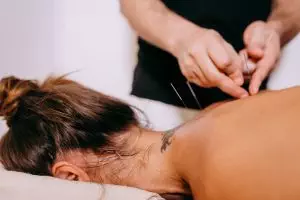
Acupuncture has a natural analgesic effect and can help relieve severe pain and chronic pain, without negative side effects.
- Acupuncture and other TCM modalities are an effective alternative for pain relief.
- Acupuncture can be used to treat both acute pain and chronic pain.
- Acupuncture can help reduce the need for opioid-like medications after surgeries, by helping relieve postoperative pain.
- Acupuncture and herbs can help postoperative wounds heal more quickly.
- Acupuncture can help cancer patients by providing pain relief and additionally helping to relieve nausea and mitigating other side effects of cancer treatment.
- Acupuncture provides pain relief without negative side effects.
- Acupuncture can help individuals who are trying to stop taking opiates avoid withdrawal symptoms.
- Acupuncture can help alleviate cravings for addictive substances.
- Acupuncture helps to effect the release of endorphins naturally, which provides the same good feelings as drugs initially do.
- Acupuncture can be a more cost effective way to treat pain and addiction than other methods.
Treatment for Opioid Dependence
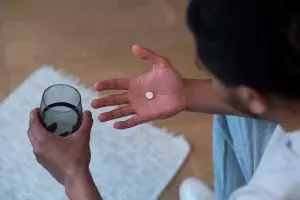
Methadone Maintenance treatment (MMT) is widely used to treat opioid addiction or dependence. This method involves replacing the opioid drug with methadone, which is a synthetic opioid, so it acts on the same centers of the brain, which helps to reduce cravings and withdrawal symptoms. This can help people wean themselves off of pain medications or heroin. However, there can be side effects, and MMT does not help everyone stop using or misusing opiates or prescription pain medications.
Long-term use of opioids can be detrimental to a person’s overall health, both mentally and physically. Hydrocodone side effects and oxycodone side effects can include: drowsiness, dizziness, nausea, vomiting, constipation, irregular heartbeat, and increased risk of respiratory problems for people with asthma or COPDs like emphysema or chronic bronchitis.
Mental health issues and opioid misuse often go together. People who suffer from depression or anxiety are much more likely to use opioids to treat pain and then become emotionally dependent on them.
Overall, evidence suggests that pharmacological methods for treating opioid misuse are not very successful. TCM and acupuncture offer an alternative treatment for opioid dependence.
Can Acupuncture Help Relieve Pain Better Than Opioids?
While there is still much to be done in the way of scientific research to demonstrate exactly how acupuncture is able to effect changes in the body and help relieve pain, there is ample enough evidence to convince the medical community that acupuncture does, indeed, have a significant analgesic effect. For two decades now, the WHO has recommended acupuncture and TCM for many different pain conditions, including:
- neck pain
- back pain
- low back pain
- Sciatica, hip pain
- postoperative pain
- headaches and migraines
- shoulder pain
- heel pain, plantar fasciitis
- TMJ pain
- Neuropathy pain
Acupuncture may work so well to relieve pain because it appears to have an effect on the central nervous system and opioid peptide neurotransmitters, including endorphins. This means that acupuncture works on the opioid receptors in the brain.
One study of patients who were in methadone treatment for opioid dependence found that people who received acupuncture were able to reduce the amount of methadone they needed.
A study on patients who had lumbar spine surgery to help severe back pain showed that acupuncture worked well as a postoperative analgesic.
Acupuncture Near Me for Pain Management and Opioid Dependence in Los Angeles
It is absolutely necessary for so many people to find pain relief when they have an acute condition, or a chronic pain condition, or are in treatment for cancer or other serious illness. Serious pain causes mental anguish as well as physical limitations. Acupuncture and TCM offer an alternative treatment for pain management that helps not only to block pain, but also to relieve stress and anxiety. At Art of Wellness, we have over 30 years of experience helping people to manage pain safely and effectively.
*This article is for education from the perspective of Traditional Chinese Medicine only. The education provided by this article is not approved by FDA to diagnose, prevent, treat and cure human diseases. It should not stop you from consulting with your physician for your medical conditions. Traditional Chinese Medicine is based on Qi, which is an invisible force that usually cannot be observed by modern science. Because science focuses on testing ideas about the natural world with evidence obtained through observation, these aspects of acupuncture can’t be studied by science. Therefore acupuncture and Chinese herbs are often not supported by double-blind, randomized trials, and they are considered alternative medicine therapies in the United States.
How to Detox With Acupuncture and TCM
By Xiaomei Cai, L.Ac., Ph.D. & Qineng Tan, L.Ac., Ph.D.
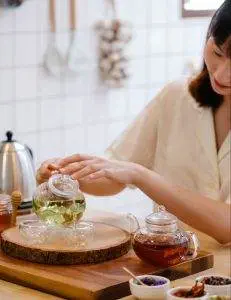
Why is it important to do a detox or body cleanse periodically? When done with the right support from an acupuncturist near me, detoxing can help improve your digestion, immune function, fertility, and many other aspects of your health. Store bought colon cleanse products or a juice cleanse won’t really do the job, though. A detox program with acupuncture and Chinese herbs will do more to optimize your health than just a detox diet will.
When we recommend our Detox Program at Art of Wellness, we are not talking about fasting or detox drinks, like a master cleanse. The goal of our program is to detoxify the organ systems of the body: it’s a liver detox, kidney cleanse, lungs, heart, and spleen. This is a full body cleanse designed to give you a health reset. According to TCM philosophy, your body knows how to repair and renew itself, but it cannot do this job when it is congested and out of balance.
In TCM, we have a broad concept of what “toxins” are and how they can affect our bodies and our health. Toxic chemicals that come from our environment, such as food additives, pesticides, cleaning products, and beauty and hygiene products are certainly part of the problem. Drugs, medicines, alcohol, and unhealthy foods can also be toxic. So can behavioral habits, like sitting and looking at our screens and devices too long.
But our own bodies produce toxins, too. The waste products our organs create are “toxic,” and if they are held in the body too long without being adequately cleared out, they can negatively impact organ function. Imbalances in the system can cause conditions of excess heat or phlegm, which can lead to all kinds of problems with both your physical and mental health.
Stress, lack of sleep, and extreme emotions can also contribute to toxic conditions in the body and mind. When the organ systems are out of balance, the body is under constant pressure to keep functioning, but we do not feel our best.
Signs you need to detox include:
- Fatigue, low energy, tired all the time
- Foggy head, memory problems, trouble concentrating
- Constipation
- Trouble sleeping, insomnia
- Weight gain
- Hair loss
- Hormone imbalances
- Signs of rapid aging
- Skin rash, acne
- Fingernails are brittle, lined or ridged
- Severe PMS symptoms or menopause symptoms
- Headaches, migraine
- Water retention, edema, swelling in extremities
Inflammation is largely created by toxic conditions in the body, and most pain conditions and chronic illnesses stem, at least in part, from inflammation somewhere.
Why You Need a Liver Detox
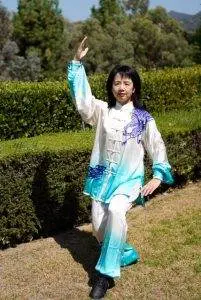
In conventional medicine, we think of the liver as being a sort of filter that removes toxins from the blood and helps metabolize fat. In TCM theory, we consider the liver to be the storehouse and distributor of blood; therefore, it also plays a crucial role in the menstrual cycle. The liver is also strongly connected to a person’s emotional life.
Stress, lack of sleep, too much sugar, alcohol, fatty, fried foods, pharmaceutical medicines, and recreational drugs all tax the liver above and beyond what it needs to do just to keep the blood flowing to nourish the body. When too many demands are placed on the liver, it can cause all kinds of symptoms, including: fatigue, insomnia, and headaches. Feelings of anger, frustration, anxiety, and irritability may arise. Conversely, when a person is feeling bitter and resentful, and isn’t able to express it, those unresolved emotions may begin to cause trouble with liver function.
Just as the liver governs the blood, in TCM, the kidneys govern the water of the body, controlling elimination through the bladder, and maintaining blood pressure by keeping the right amount of water in the bloodstream. Signs that the kidneys are not balanced include: problems with blood pressure, edema, puffiness in the face or extremities, UTIs, chronic fatigue, and menopause symptoms, like dryness and hot flashes.
Detoxing the organ systems, including the liver and kidneys especially, can help rejuvenate the digestion and allow better nutrition to reach all parts of the body, as the quality and flow of blood and other bodily fluids will be improved.
Making sure that your excretory system is in good working order before starting a cleanse is important. If you are already having problems with constipation, for example, we will want to make sure we get things moving before we start cleansing the organs. Our detox also focuses on the body’s largest excretory organ: the skin.
Top 10 Reasons To Detox
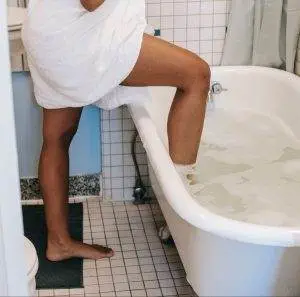
It is a good idea for everyone to detox periodically; detoxing every six months is reasonable for most people. Sometimes we will specifically recommend a detox for a patient when they are struggling with a particular health problem, or if they are planning a pregnancy.
Detoxing can help:
- Boost Immunity – a cleanse will help get your lymphatic system, which produces and transports immune cells and removes waste from cells, moving, improving the efficacy of your immune system.
- Break Free From Addiction – if you are ready, a commitment to the detox program and food plan can help you end patterns of substance abuse, drug use, alcohol addiction, smoking, and other types of dependency.
- Infertility – We often advise people who come to Art of Wellness for fertility treatment to begin with the Detox Program. Not only will this help increase the chances of conception occurring, whether naturally or with the aid of ART, but it will also lay the foundation for your child’s health in the future.
- Improve sleep – This works both ways. In order for the body to do its routine daily work of removing toxic waste, it needs plenty of sleep. The Liver, in particular, is working hard through the night to clean and deliver fresh blood to the cells. Sleeping on your side enhances your body’s ability to do this work, allowing the internal organs to drain properly. When your body is functioning well, your sleep will be of better quality, more restful and refreshing.
- Improve skin and hair – Dull eyes and skin, dark circles or bags, puffiness, and thinning hair are signs of stagnant blood and Qi. Nutrients from the right foods and Chinese herbs help to nourish the skin, and clear heat, dampness, and dryness. When old cells are removed, hair and eyes can shine again. Acupuncture treatment can help stimulate collagen production, which also happens while you sleep.
- Weight loss – While our acupuncture detox is not about how to lose belly fat fast, many people will find that it gives them a good foundation for new eating habits. Detoxing the liver and kidneys will help your body metabolize fat better.
- Balance hormones – severe PMS symptoms, bloated stomach and mood swings, perimenopause symptoms, infertility in women and infertility in men (oligospermia) can all be improved when hormone function improves. Acupuncture treatment can also help relieve conditions like PCOS, fibroids/leiomyoma, and endometriosis for women, and BPH in men.
- Reduce inflammation – many illnesses and pain conditions are inflammatory in nature. If you are suffering from pain due to plantar fasciitis, gout, rheumatoid arthritis, tennis elbow, carpal tunnel syndrome, shoulder or hip pain, acupuncture can help.
- Increased energy – better nutrition, better circulation, better sleep, and better organ function will all work synergistically to help you feel more energetic.
- Chronic illness – many chronic illnesses are rooted in toxic conditions within the body or exposure to toxins. Hard-to-treat conditions like autoimmune conditions and other systemic problems may be helped with alternative medicine when conventional medical treatments have not been successful. We treat many conditions with acupuncture and herbs, such as: lupus, lyme disease, celiac disease, fibromyalgia, and Crohn’s disease. We also provide support for people going through cancer treatment.
7 Steps of Detox Program With TCM Acupuncture and Herbs
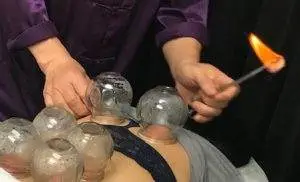
Pain and dysfunction occur when there is imbalance and when there are areas of stagnation within the body. Think of the metaphor of a house that needs to be deep-cleaned; there are dark corners of the body that have been ignored for a while, where dust and cobwebs have gathered. The Detox program reaches into these pockets of stagnation, sweeps them clean, and makes sure they get some fresh air and sunlight shining on them, in the form of invigorated Qi and blood.
- Acupuncture Treatments – the primary goal of acupuncture treatments during the detox phase is to get Qi moving freely, remove blockages, and to assist in elimination of toxins from the body.
- Cupping Treatment – the TCM modality of cupping creates a vacuum-like suction that moves Qi and blood from the innermost parts of the body outwards. During the detox program, cupping helps to pull toxins out of the lungs and other organs.
- Detox Herbs – the Chinese herb detox tea helps to clear heat and toxins from the body and improve digestion and elimination.
- Foot Pad Detox – detox foot patches, worn as you sleep at night and removed in the morning, help to pull toxins and fatty deposits from the body.
- Detox Bath – Sweating is an excellent way to remove toxins through the skin; this is why so many traditions rely on saunas and hot baths. Our herbal sachets allow you to enjoy a therapeutic herbal soak in your own bathtub.
- Exercise – Your acupuncturist will instruct you on how to practice daily exercises, based on QiGong movements, that will help to get Qi and blood moving.
- Nutrition – the food plan during the detox is based on whole grains, lean proteins, and plenty of vegetables, flooding your system with nutrients.
Detox Near Me Los Angeles, Westside
The beginning of the year, springtime, after recovery from a long illness, while preparing for a healthy pregnancy–anytime may be the right time for you to detoxify your system and get a fresh start. We recommend that you take the time to dedicate yourself to a week of cleansing with the Art of Wellness Detox Program at least twice a year for optimal health benefits.
*This article is for education from the perspective of Traditional Chinese Medicine only. The education provided by this article is not approved by FDA to diagnose, prevent, treat and cure human diseases. It should not stop you from consulting with your physician for your medical conditions. Traditional Chinese Medicine is based on Qi, which is an invisible force that usually cannot be observed by modern science. Because science focuses on testing ideas about the natural world with evidence obtained through observation, these aspects of acupuncture can’t be studied by science. Therefore acupuncture and Chinese herbs are often not supported by double-blind, randomized trials, and they are considered alternative medicine therapies in the United States.
How to Treat PMS With Acupuncture and TCM
By Xiaomei Cai, L.Ac., Ph.D. & Qineng Tan, L.Ac., Ph.D.
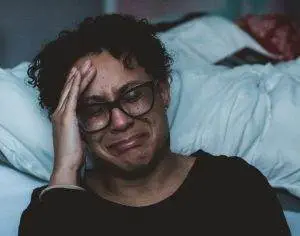
Monthly mood swings, bloated stomach, headaches, and weight gain. Why is PMS so bad? Premenstrual syndrome (PMS) is a set of symptoms that occur in the days before a woman gets her period. PMS symptoms affect every woman differently, and can be serious enough to disrupt your life every month. TCM is an effective way to deal with PMS, because acupuncture treatment can help relieve both physical and emotional symptoms of PMS and severe PMS, also known as PMDD (premenstrual dysphoric disorder).
To say that PMS is common among women is an understatement. The vast majority of women experience some changes in both their mental health and their bodies the week before their period starts. Whether or not a woman feels that it has a negative impact on her daily life may change over time. For some women, PMS isn’t a big deal; for others, it’s a major problem that can affect their relationships, impact their work, and make life hell every month.
Most women find their own particular pattern of PMS is somewhat predictable–until it isn’t. One of the most frustrating aspects of menstrual problems is the sense that things change without warning, and symptoms can come on suddenly with ferocious intensity. It can be difficult to describe how you feel before your period, because the symptoms seem to come and go. Some women find that their PMS symptoms are different from month to month. In some cases, they might find that every other month is bad, while the alternating months aren’t so bad. Why is PMS worse some months?
Other than the basic understanding that PMS is caused by fluctuations in hormones and brain chemistry, conventional medical science does not offer much in the way of clear answers about what causes PMS.
TCM provides a different framework for looking at menstrual problems and has been used to treat women’s health issues of all kinds for many centuries. TCM treatments including acupuncture, acupressure, moxibustion, and Chinese herbs can not only help relieve PMS symptoms, they can also be beneficial for other menstrual problems like irregular periods, PCOS, painful periods, endometriosis, heavy periods, fibroids, and symptoms of perimenopause.
Top 10 Symptoms of PMS
As a syndrome, PMS is considered a collection of symptoms that often appear together, in various combinations in different individuals. In the case of PMS, a woman may feel that her own symptoms change as often as every month, or gradually over the course of years. Girls in their teenage years may experience PMS in one way. Then, a woman in her early adult years may develop a different set of symptoms. After having a baby, a woman may find that her PMS symptoms have changed again. Then, many women in middle age experience changes in PMS symptoms as they go through perimenopause, approaching menopause. The most common signs of premenstrual syndrome include:
- Mood swings, low mood, feelings of sadness or anger
- Anxiety, feeling tense and irritable, cry easily or lose temper, want to be left alone
- Trouble sleeping, insomnia, disturbed sleep
- Breast tenderness, sore breasts, swollen breasts
- Food cravings, changes in appetite
- Weight gain, stomach bloating, water retention, pelvic pressure
- Gassiness, changes in digestion and elimination
- Acne, skin problems
- Changes in libido
- Headaches, migraines, difficulty concentrating, foggy head
Less obvious or well-known symptoms of PMS include: vision problems, tingling in the arms or legs, lack of coordination (clumsiness, dropping things), bruising easily, heart palpitations, dizziness, itchy skin, cold sores, toothaches, back pain, joint pain, and increased TMJ jaw pain.
Other health problems can be amplified during the premenstrual period, such as: chronic fatigue syndrome, fibromyalgia, interstitial cystitis, migraines, IBS, Meniere’s disease (dizziness, vertigo), clinical depression and anxiety disorders.
The physical and emotional aspects of PMS can affect each other, causing the typical mood swings. Feelings of sadness and frustration, or lack of sleep, may lead to comfort eating, but then the sight and sensation of your bloated stomach can cause you to feel depressed about your body. Minor problems with your spouse or co-workers can suddenly seem overwhelming and make you feel angry or helpless.
For some women, PMS symptoms are so bad that they feel unable to function the week before their period. Severe PMS is now diagnosed as PMDD.
What Is PMDD?
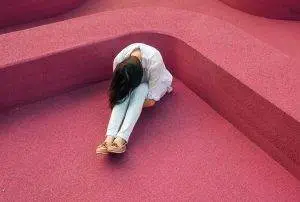
PMDD (premenstrual dysphoric disorder) is a severe form of PMS marked by intense emotional symptoms that dramatically impact a woman’s life, in addition to physical symptoms. “Dysphoria” is the opposite of “euphoria;” in other words, it is a mental state characterized by profound unhappiness and negative feelings. It is estimated that about 5% of all women experience this extreme type of PMS. Signs of PMDD include:
- Severe anxiety, panic attacks, paranoia
- Severe depression, in some cases even suicidal thoughts, lack of self-worth
- Anger and irritability that provokes rage and causes conflicts with other people
- Fatigue, low energy, inability to concentrate, feelings of confusion
- Intense food cravings, possibly leading to binge eating
Again, there is currently no scientific answer for what causes PMDD, although it is generally believed to be related to the way estrogen levels and progesterone levels change between ovulation and the onset of the menstrual period. Mood is considered to be related to serotonin levels in the brain, and this is why PMDD is usually treated with birth control pills, which suppress ovulation, and/or antidepressants (SSRIs), which affect serotonin uptake.
Medical Treatment for PMS
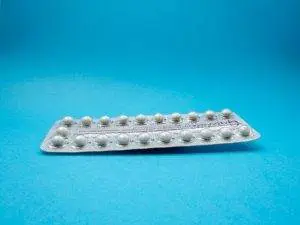
Naturally, when a woman asks for advice about PMS or PMDD, she is going to hear suggestions like: “try meditating, exercise more, eat a healthy diet, and get more sleep.” And it is true that making good lifestyle choices is an important part of helping to reduce PMS symptoms. But women who are suffering with serious PMS need solutions beyond these kinds of lifestyle guidelines.
When women complain of PMS symptoms, doctors will most often recommend OTC pain medications like ibuprofen or acetaminophen (NSAIDs) to relieve pain. Diuretics may be used to relieve bloating or premenstrual weight gain. Of course, most commonly, women are prescribed oral birth control pills, which suppress ovulation, and therefore may reduce the severity of PMS symptoms. More and more frequently, women may be prescribed antidepressants to try to deal with emotional symptoms and mood swings, or anxiety medications to take as needed during PMS. In effect, doctors often treat PMS the same way they would depression or anxiety.
Clearly, birth control pills are not helpful for women who may want to get pregnant, and some women may be concerned about how taking the pill or antidepressants may affect their fertility in the future. None of these pharmacological solutions for PMS address the root cause of the symptoms, and all of these medications carry side effects that may impact a woman’s overall health. Health care for women with TCM seeks to address the deeper internal causes of hormonal imbalances and other problems with the organ systems that are impacting the health of the ovaries and the regularity of the menstrual cycle.
Can Acupuncture Help PMS?

While it is only in recent years that conventional medicine has begun to acknowledge connections between physical health and emotional health, TCM has understood for many hundreds of years that health conditions of all kinds, especially those related to the menstrual cycle, are rooted in the balance of energies. Menstruation represents an ongoing process of transformation that occurs not only within the reproductive organs, but which affects every part of a woman, and even the people around her.
The concept of Yin and Yang in Chinese philosophy describes two opposing yet complementary forces that are constantly acting upon each other in order to achieve balance. The menstrual cycle is very much based on Yin and Yang energies; during the follicular phase of the cycle (before ovulation), Yin is increasing while Yang is decreasing, and in the luteal phase (after ovulation, before the period), Yang is increasing while Yin is decreasing. The system is designed, naturally, to create the right conditions for conception; this process of Yin and Yang exchange is what determines a woman’s fertility.
While the health of the uterus and ovaries is definitely central to the process, within the TCM philosophy, they are not the only organs involved with menstruation. The Kidneys, Liver, and Heart all have important roles to play, as well. In TCM, we also view the elements of Fire–to provide warmth, controlled by the Heart–and Water, controlled by the Kidneys–to provide moisture, as being vital to all processes within the body, especially to menstruation. Blood is cleansed, stored, and then distributed to the other organs by the Liver. Blood being central to the process of menstruation, the Liver’s role is really key in how the whole thing plays out.
According to TCM theory, most PMS and PMDD symptoms are caused by problems with Liver Qi. When the Liver Qi is out of balance, it can lead to feelings of anger, frustration, depression, and irritability. The Liver system is particularly susceptible to negative effects of stress.
There are a few different variations of Liver Qi imbalance and other patterns that can contribute to PMS symptoms:
- Liver Qi invasion – This is a condition of excess, in which there is too much rising Liver Qi, characterized by overall negative emotions that are disruptive, including anger and anxiety, breast tenderness, headaches, dizziness, and constipation.
- Liver Qi depression – In this case, there is not enough Liver Qi, causing feelings of sadness, heaviness in chest, painful swelling of breasts, sighing, bloated stomach, lack of appetite, cramping during period, scanty blood during period.
- Spleen Kidney deficiency – In this case, stagnant energy in the Kidney system is preventing water from moving appropriately, causing water retention or edema.
From the scientific medical standpoint, acupuncture treatment has been shown to have a positive effect on neurotransmitters like serotonin, and to impact levels of estrogen and progesterone. This happens naturally because we are using TCM methods to restore optimal function of all the organs. With Chinese herbs we are able to get specific nutrients into the body that we cannot get from the foods we normally eat.
Acupuncture treatment accompanied with specific herbs for PMS patterns can help balance the liver Qi, and bring all of the organs into synergistic harmony.
In order to make lasting change, it is best to have acupuncture treatment at least once or twice a week. We need to deal with each phase of the menstrual cycle as it occurs by tailoring the acupuncture treatment and herbs to your PMS and period symptoms.
A systematic review of ten controlled trials using acupuncture to treat PMS concluded that TCM treatment of PMS significantly improved symptoms.
Top 3 Tips for PMS Relief From TCM Perspective

There are still a lot of taboos surrounding women’s health, and many girls and women have never learned how to take care of their reproductive health. Working with an experienced TCM doctor will enable you to get personalized care and advice about how to eat the best diet for PMS symptoms, what activities to avoid before your period, and other female hygiene tips that you may not have heard before.
- Nutrition – conventional Western thinking about healthy eating currently focuses on eating fresh, whole foods, which is good, except that people tend to think this means eating a lot of foods raw or cold, as in salads and smoothies. According to the TCM philosophy of nutrition, though, eating cold foods is actually one of the worst things you can do when it comes to relieving PMS and painful periods. Putting a lot of cold food into the stomach cools down the temperature of the other internal organs, which can contribute to more cramping and worse cramps. During the week before your period, concentrate on eating plenty of nourishing, cooked foods like soups and stews, proteins and vegetables, and whole grains like brown rice and quinoa. Avoid too much dairy, sugar, caffeine, hot, spicy or fried foods (that includes chips and crackers), and definitely avoid icy cold beverages and frozen treats.
- Keep track of your period – there are many apps available now to help with this, but it can also be a simple chart with room for notes about your symptoms. Keeping track of your PMS symptoms every month can help you recognize patterns in your own behaviors and experiences. A record of PMS symptoms will also help you communicate what you’re feeling to your health care providers when you are seeking treatment for PMS or PMDD.
- Exercise – gentle movement modalities that move Qi through the body are great to help PMS: Tai Qi, yoga, or dancing are all good. Avoid deep twists that could squeeze or put pressure on the ovaries and other organs. Again, keep track of your exercise routines and how they affect your physical and emotional wellbeing from month to month so that you can see which type of workout is best for you, or if some types of exercise make PMS worse.
Acupuncture Near Me for PMS in Los Angeles, CA
Many women come to us at Art of Wellness seeking help with menstrual problems or fertility issues. We have over 30 years of experience in helping to relieve symptoms of PMS and all types of period pain and dysfunction. It is possible for the menstrual cycle to flow without extreme feelings or strong physical discomfort. If you feel like PMS or PMDD is negatively impacting your life every month, please do not hesitate to give us a call.
*This article is for education from the perspective of Traditional Chinese Medicine only. The education provided by this article is not approved by FDA to diagnose, prevent, treat and cure human diseases. It should not stop you from consulting with your physician for your medical conditions. Traditional Chinese Medicine is based on Qi, which is an invisible force that usually cannot be observed by modern science. Because science focuses on testing ideas about the natural world with evidence obtained through observation, these aspects of acupuncture can’t be studied by science. Therefore acupuncture and Chinese herbs are often not supported by double-blind, randomized trials, and they are considered alternative medicine therapies in the United States.